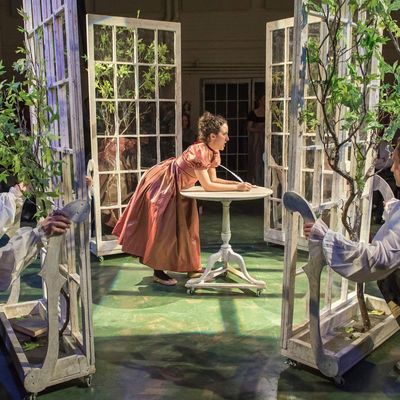
My Kindle tells me that it takes an average reader some ten hours to get through Jane Austen’s Sense and Sensibility. The delightful Bedlam stage version, which had a successful run in 2014 and is now being revived at the Gym at Judson, takes about two. (Saving extra time, the and in the title has been replaced by an ampersand.) Naturally, with 80 percent less eyeball engagement, there’s going to be some depth lost; Austen’s prose is hilarious and penetrating but not especially theatrical. Long stretches go by with no dialogue, and in shaping climactic moments she often lets the reader’s imagination do a lot of the work. Not so Kate Hamill, who wrote the adaptation and stars as one of the Dashwood sisters, Marianne. Like that character, her gloss on the masterpiece is sometimes too dramatic for its own good: bug-eyed where Austen merely lifts an eyebrow, its high points wanting only organ music to tip them into old-style soap opera. Still, it’s robust fun throughout, which is more than one can say about poor Marianne.
Marianne, you see, represents the Sensibility portion of the title. (To Austen, this meant what we might call sensationalism: the product of an overactive romantic imagination.) Representing Sense — clear-headedness even about affairs of the heart — is Marianne’s older sister, Elinor. The two approaches to life might make little difference if their lives proceeded as planned, but when their father dies, his estate entailed to a son by an earlier marriage, the girls and their mother (and a younger sister who barely registers in the novel) are forced off the ancestral estate and into genteel poverty. How they will ever land husbands when they have so little to offer besides intelligence, beauty, and needlework skills is the engine of the story: Beneath the curricles and barouches, the shrubberies and ha-has, the mobcaps and farthingales, Austen is all about the green.
In its mission to entertain at all costs, the Bedlam version, directed by co-founder Eric Tucker, lets that unfunny truth disappear a lot of the time. In this and much else there is the slight whiff of dumbing-down, as if a straight-ahead relating of the story could not engage a modern audience. Indeed, Tucker starts the play with the cast dancing to contemporary pop in modern dress, as if to make sure we connect to a familiar social experience before flipping back to the music and costume of late 18th-century England. Even there, he too frequently pulls modern gimmicks out of his reticule. At one point, Marianne, fed up, holds up her hand in the universal “I can’t even” gesture; at another, a conflict that in the Austen is entirely internal is rendered as a claws-and-hair-yanking mêlée. There’s hardly a story-theater trope untried, including homemade sound effects, silly wigs, trick props, and sudden role switches. (The cast of ten plays perhaps 20 characters, including a horse or two.) None does any harm, though I doubt many help, either, except for the marvelous idea of having all the furniture racing around on wheels. Manipulated by the actors themselves, the chairs and tables and sofas perform a complicated dance that strongly supports the way, in Austen, drama arises from the distortions of intimacy that a fundamentally false society all but enforces. Where you sit is what you are.
Still, for much of the show, I couldn’t help wondering why we needed so much theatrical evangelism for a work whose original version is still completely readable (and popular) 200 years after publication. The enjoyable overacting of most of the supporting roles, and to some extent of Marianne, too, suggested a form of bad faith. Happily, as the focus gradually switched from Marianne to Elinor, who faces some of the same disappointments as her sister but keeps them entirely to herself, the tone changed, too, and the grave simplicity of Andrus Nichols’s fine performance steadied the storytelling. In some ways her conception of Elinor even solves a slight problem with Austen’s: In the novel, Elinor has little or nothing to learn about herself through the plot’s machinations. She is perfectly pragmatic right from the start; only Marianne has to change dramatically. But as Nichols has fashioned Elinor for the stage, that pragmatism is, at first, almost insufferably pat, and so, over the course of the action, she must learn to meet her sister partway. When she does, and gets her man, it’s therefore a joyful moment, perhaps more so because we see it onstage. Or perhaps it only feels more joyful because Austen’s cynical view doesn’t let us forget that Elinor’s getting the man means getting back the security of a home, an income, and a place in the world. The play omits this final note; after all, it is more of a Marianne than an Elinor, which is to say a comedy, not a classic.
Sense & Sensibility is at the Gym at Judson through April 10.




